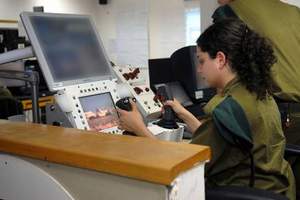
Female soldiers are preferred to operate remote killing devices because of a shortage of male recruits to Israel’s combat units.
NAZARETH // It is called Spot and Shoot. Operators sit in front of a TV monitor from which they can control the action with a PlayStation-style joystick.
The aim: to kill.
Played by: young women serving in the Israeli army.
Spot and Shoot, as it is called by the Israeli military, may look like a video game but the figures on the screen are real people – Palestinians in Gaza – who can be killed with the press of a button on the joystick.
The female soldiers, located far away in an operations room, are responsible for aiming and firing remote-controlled machine-guns mounted on watch-towers every few hundred metres along an electronic fence that surrounds Gaza.
The system is one of the latest “remote killing” devices developed by Israel’s Rafael armaments company, the former weapons research division of the Israeli army and now a separate governmental firm.
According to Giora Katz, Rafael’s vice president, remote-controlled military hardware such as Spot and Shoot is the face of the future. He expects that within a decade at least a third of the machines used by the Israeli army to control land, air and sea will be unmanned.
The demand for such devices, the Israeli army admits, has been partly fuelled by a combination of declining recruitment levels and a population less ready to risk death in combat.
Oren Berebbi, head of its technology branch, recently told an American newspaper: “We’re trying to get to unmanned vehicles everywhere on the battlefield … We can do more and more missions without putting a soldier at risk.”
Rapid progress with the technology has raised alarm at the United Nations. Philip Alston, its special rapporteur on extrajudicial executions, warned last month of the danger that a “PlayStation mentality to killing” could quickly emerge.
According to analysts, however, Israel is unlikely to turn its back on hardware that it has been at the forefront of developing – using the occupied Palestinian territories, and especially Gaza, as testing laboratories.
Remotely controlled weapons systems are in high demand from repressive regimes and the burgeoning homeland security industries around the globe.
“These systems are still in the early stages of development but there is a large and growing market for them,” said Shlomo Brom, a retired general and defence analyst at the Institute of National Security Studies at Tel Aviv University.
The Spot and Shoot system – officially known as Sentry Tech – has mostly attracted attention because it is operated by 19- and 20-year-old female soldiers, making it the Israeli army’s only weapons system operated exclusively by women.
Female soldiers are preferred to operate remote killing devices because of a shortage of male recruits to Israel’s combat units. Young women can carry out missions without breaking the social taboo of risking their lives, said Mr Brom.
The women are supposed to identify anyone suspicious approaching the fence around Gaza and, if authorised by an officer, execute them using their joysticks.
The Israeli army, which plans to introduce the technology along Israel’s other confrontation lines, refuses to say how many Palestinians have been killed by the remotely controlled machine-guns in Gaza. According to the Israeli media, however, it is believed to be several dozen.
The system was phased-in two years ago for surveillance, but operators were only able to open fire with it more recently. The army admitted using Sentry Tech in December to kill at least two Palestinians several hundred metres inside the fence.
The Haaretz newspaper, which was given rare access to a Sentry Tech control room, quoted one soldier, Bar Keren, 20, last week saying: “It’s very alluring to be the one to do this. But not everyone wants this job. It’s no simple matter to take up a joystick like that of a Sony PlayStation and kill, but ultimately it’s for defence.”
Audio sensors on the towers mean that the women hear the shot as it kills the target. No woman, Haaretz reported, had failed the task of shooting what the army calls an “incriminated” Palestinian.
The Israeli military, which enforces an unmarked no-man’s land inside the fence that reaches as deep as 300 metres into the tiny enclave, has been widely criticised for opening fire on civilians entering the closed zone.
Rafael is reported to be developing a version of Sentry Tech that will fire long-range guided missiles.
Another piece of hardware recently developed for the Israeli army is the Guardium, an armoured robot-car that can patrol territory at up to 80km per hour, navigate through cities, launch “ambushes” and shoot at targets. It now patrols the Israeli borders with Gaza and Lebanon.
Its Israeli developers, G-Nius, have called it the world’s first “robot soldier”.
But Israel is most known for its role in developing “unmanned aerial vehicles” – or drones, as they have come to be known. Originally intended for spying, and first used by Israel over south Lebanon in the early 1980s, today they are increasingly being used for extrajudicial executions from thousands of feet in the sky.
Jonathan Cook, Foreign Correspondent
Last Updated: July 13. 2010 7:12PM UAE / July 13. 2010 3:12PM GMT
Source: The National